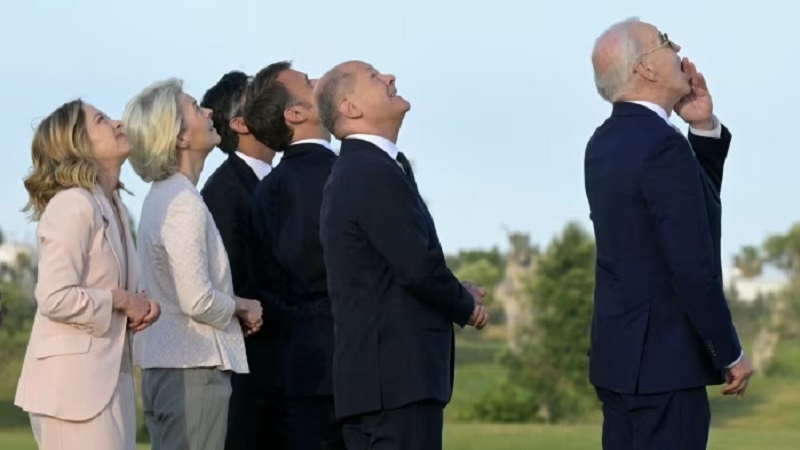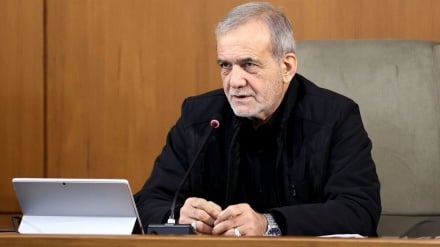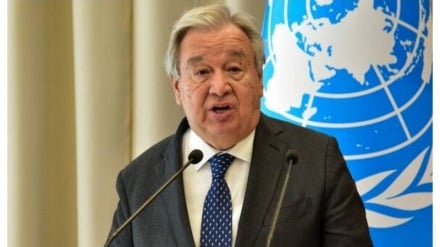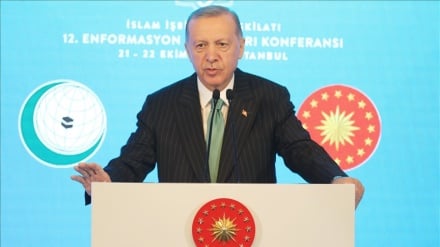Why is Europe a political dwarf?
-

Why is Europe a political dwarf?
Pars Today- According to an expert, as the Europeans have failed to adopt a policy, independent from the US, towards the important issue of Ukraine war, taking an approach similar to Washington, they are after hostility with Tehran.
Boycotting Iranian airliners and accompanying the UAE claim on the three Islands using the word, "Occupation" against Tehran, in a bid to detract minds from the Israeli Occupying regime, reveal that a new round of anti-Iran policies has emerged among the Europeans. Iranian daily Shargh has interviewed with university professor and senior analyst of the European continent, Ali Rezvanpoor, on the reason for adopting this anti-Iran policy by Europe in the present conditions of West Asia. The following is the full text of this interview:
Q: It seems that we have seen the accentuating of anti-Iran policies by Europeans for the recent weeks in the form of enforcement of sanctions on airline companies on the one hand and the support for the UAE claim on the three Islands on the other hand. The Europeans' anti-Iran look was so hostile that they used the word "Occupation" for Iran! What is the reason for this surge of anti-Iran policy in Europe in your opinion? Is it related to the allegations about Tehran's support for Moscow in the Ukraine war or there are other reasons?
A: I believe the main axis of adopting these anti-Iran policies has its roots in the lack of political independence in Europe. You know, the fact of the matter is that the European Union is not able to take an independent policy based on its interests towards other countries. Mark Eyskens, the Belgian Foreign Minister in the 90s, who was the EU foreign policy representative simultaneously, likened the EU to an economic giant and a political dwarf; economic giant because the EU is considered as an economic power after the US, Japan and China, but in foreign policy and diplomacy, this union is completely following the United States, Therefore, in sensitive issues, this union, through some statements and stances, tries to show that it has a policy independent from the US. This is while, during the recent weeks and months, due to the repeated allegations about the Islamic Republic of Iran, the European Union has tried, with some measures, stances and sanctions, to tarnish Iran's image in the world the most important of which is related to the allegation on sending of ballistic missiles to Russia in the Ukraine war. The same issue has somehow had its effect in the EU's view about Iran's rule on the three Islands which is included in violation of the Islamic Republic of Iran's sovereignty and territorial integrity. The fact is that as the Europeans have failed to adopt a policy, independent from the US, towards the important issue of Ukraine war, in an approach similar to Washington, they are confronting Tehran.
Q: Will this deepen the rift in the relations of Iran and Europe in the administration of Mr. Pezeshkian?
A: Deepening the rift is not from Iran's side, as Mr. Pezeshkian, both in the presidential campaign, the endorsement ceremony, the swearing-in ceremony and after that has, time and again, reiterated that the 14th administration's policy will be based on the three principles of the Leader of [the Islamic] Revolution, namely, dignity, wisdom and expediency; and according to these three principles, the new government is seeking to regulate relations with all regional and trans-regional players. Thus, the 14th administration, wherever the national interests and security require, will take its decisions. But, to complete what I said, it seems that both the anti-Iran policies of the Zionist regime and the US ballyhoos have caused the Europeans to fail to pursue an independent policy based on mutual respect towards Iran.
Contrary to what you said, the point to note in the relations with Europe is related to the October 2025 ultimatum before the expiry of resolution 2231 as the guarantee for the JCPOA implementation. It seems that the three European members of the nuclear deal will seek new negotiations or activate snapback mechanism till that time to return the 6 UN Security Council resolutions. Then, how do you see the Tehran and Green Continent ties?
As for the JCPOA, Iran was not the country which left this agreement. But, during the remained time, if the Europeans, especially the three JCPOA members, are seeking to activate the snapback mechanism and return the UNSC resolutions, their reputation will be questioned.
Q: Why?
A: Because it was not Tehran which exited the JCPOA and the Americans themselves have admitted clearly that the greatest disaster in the foreign policy of the Donald Trump administration was to exit the JCPOA and this is contrary to what the US media are stressing [to say] that Abraham Accords and normalization of ties of the UAE, Bahrain, Sudan and Morocco with the Zionist regime was the greatest achievement of Donald Trump. This is a point that National Interest has announced and it was after the US exit that the Europeans faced a kind of frustration in execution of their commitments under the JCPOA. In view of this, the Europeans not only haven't executed their commitments, they have rather acted the opposite and this was to corroborate what I had said earlier, that is, the Europeans cannot pursue a separate policy independent from the US in any issue from the Ukraine war to the JCPOA and other sensitive issues.
Q: You pointed to the three principles of dignity, wisdom and expediency mentioned by the Leader. The Leader, too, during the endorsement ceremony of Pezeshkian, mentioned his view on enhancement of relations with Europe. Can we see the enhancement of ties in line with this point?
A: As I said before, the foreign policy of Mr. Pezeshkian administration is based on his own mottos of dignity, wisdom and expediency highlighted by the Leader. But, in the very endorsement ceremony, the Leader mentioned a very important point, that, wherever the national interests and national security of Iran is at risk in relations with the Europeans, the US, Asia, Africa or anywhere else, we should stand against it; but if any country or player has a proposal or solution to improve the relations in line with the Iranian interests, we can revise our relations.
Altogether, I can answer this question in this way: If the Europeans are seeking to escalate anti-Iran policies and measures such as activating the snapback mechanism and returning of the UNSC resolutions during the next months till October 2025, in addition to damaging their reputation, they must accept the consequences of this move, too. But if, instead of escalation of anti-Iran policy, Europe finds a solution within the framework of diplomatic talks and based on mutual respect, Mr. Pezeshkian's government will surely give a positive response to it based on the three principles of dignity, wisdom and expediency. Therefore, the future of the Iran-Europe ties depends on the European's performance.
Key phrases: Iran and Europe, Iran and Europe relations, Ukraine war, Europe and Israel
RM/ME


